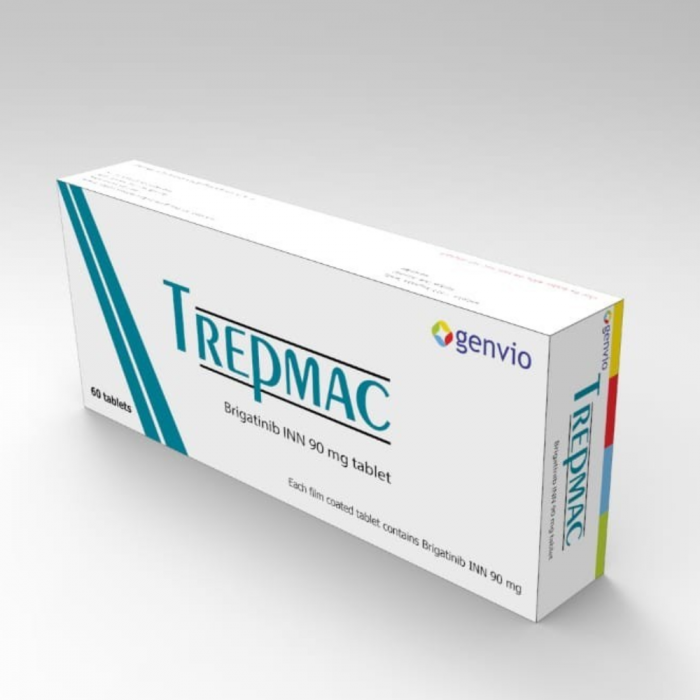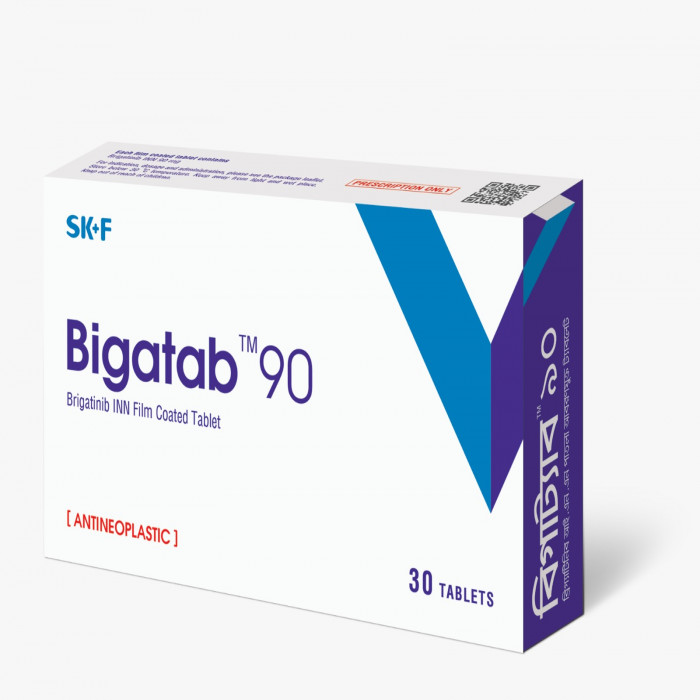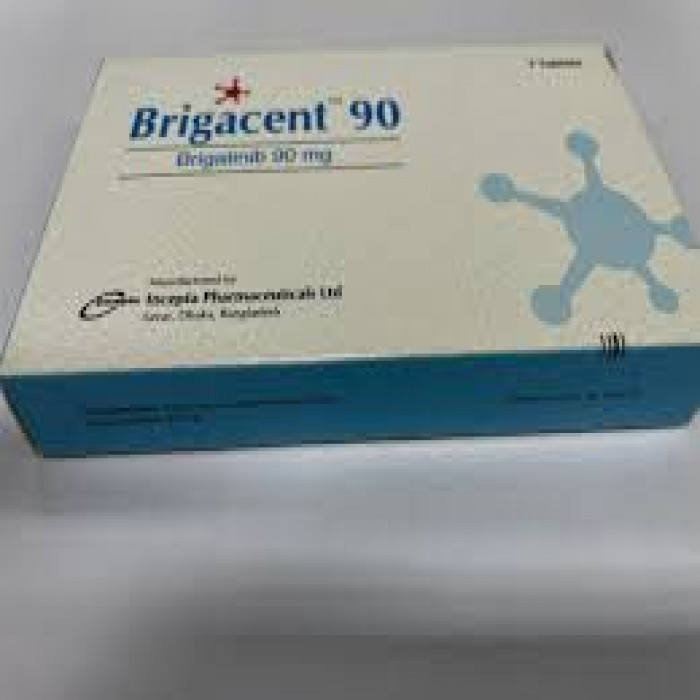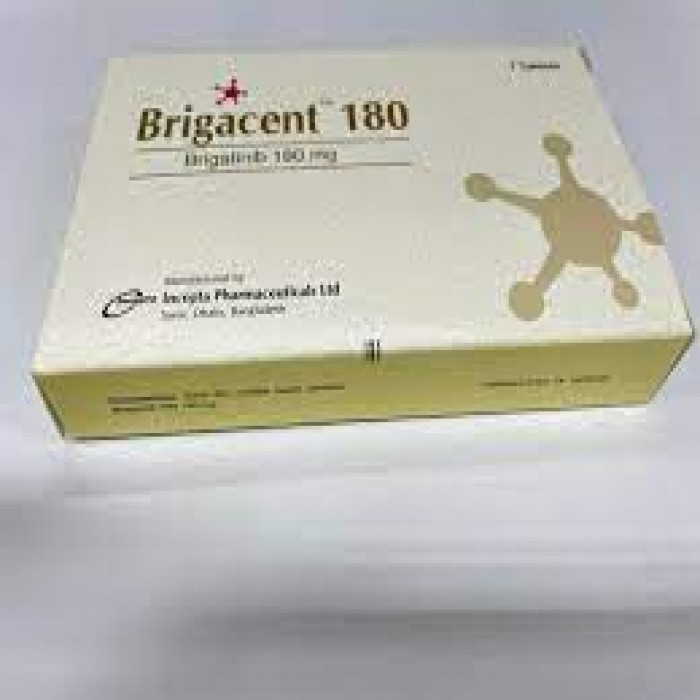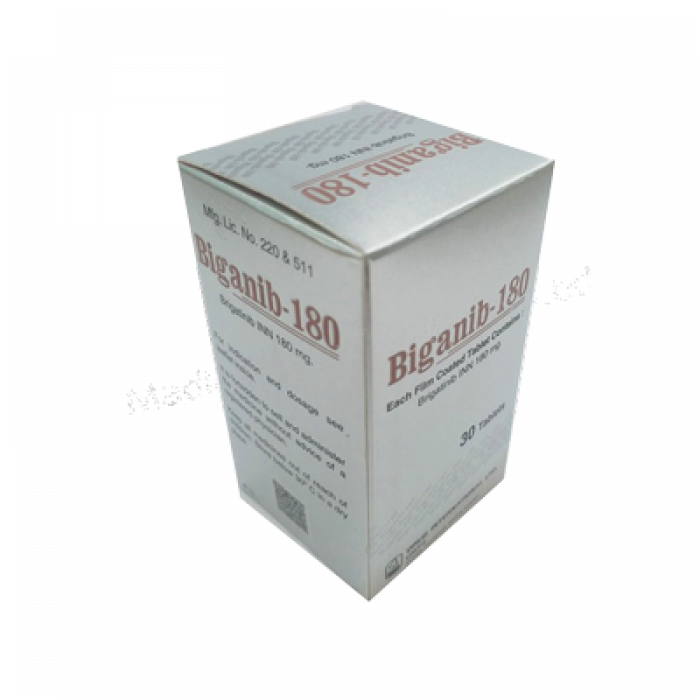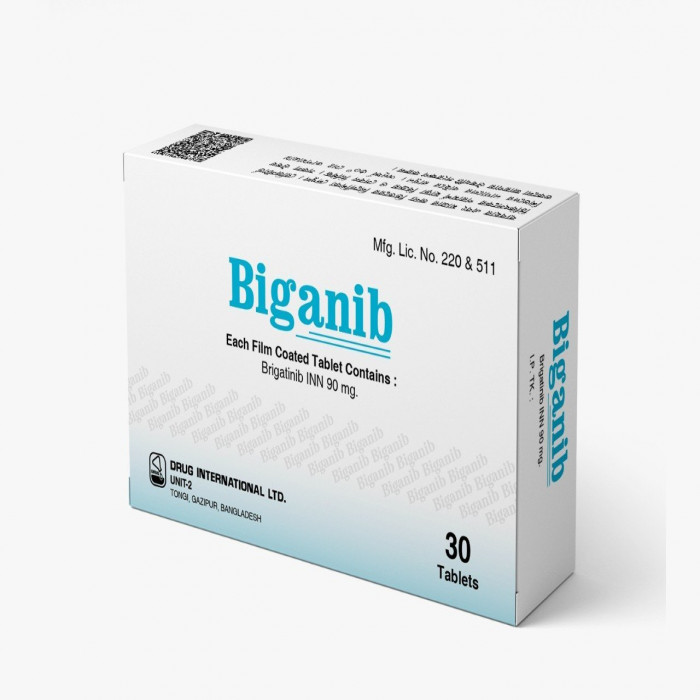
✔ 100% Authentic Product
👁️ Currently Viewing 1963
Biganib is indicated for the treatment of patients with anaplastic lymphoma kinase (ALK)-positive metastatic non-small cell lung cancer (NSCLC) who have progressed on or are intolerant to Crizotinib.
Discount
Price: ৳ 39,900
MRP:
৳
42000
5%
Off

100% Genuine Products, Guaranteed

Safe & Secure Payments, Always

Fast, Secure & Efficient Delivery

Proper Packaging
 Cash on Delivery - All over Bangladesh
Cash on Delivery - All over Bangladesh Regular Delivery - 12-24 Hours, Dhaka City* Charge Tk.39-59
Regular Delivery - 12-24 Hours, Dhaka City* Charge Tk.39-59 Regular Delivery - 24-48 Hours, Other Cities* Charge Tk.99-110
Regular Delivery - 24-48 Hours, Other Cities* Charge Tk.99-110
 ফ্রি ডেলিভারিঃ - ৯৯৯ টাকা+ অর্ডারে, ঢাকা
শহরে
ফ্রি ডেলিভারিঃ - ৯৯৯ টাকা+ অর্ডারে, ঢাকা
শহরে ফ্রি ডেলিভারিঃ - ২৯৯৯ টাকা+ অর্ডারে, ঢাকার
বাহিরে
ফ্রি ডেলিভারিঃ - ২৯৯৯ টাকা+ অর্ডারে, ঢাকার
বাহিরে
100% Genuine Products, Guaranteed
Safe & Secure Payments, Always
Fast, Secure & Efficient Delivery
Proper Packaging
 Cash on Delivery - All over Bangladesh
Cash on Delivery - All over Bangladesh Regular Delivery - 12-24 Hours, Dhaka City* Charge Tk.39-59
Regular Delivery - 12-24 Hours, Dhaka City* Charge Tk.39-59 Regular Delivery - 24-48 Hours, Other Cities* Charge Tk.99-110
Regular Delivery - 24-48 Hours, Other Cities* Charge Tk.99-110 ফ্রি ডেলিভারিঃ - ৯৯৯ টাকা+ অর্ডারে, ঢাকা
শহরে
ফ্রি ডেলিভারিঃ - ৯৯৯ টাকা+ অর্ডারে, ঢাকা
শহরে ফ্রি ডেলিভারিঃ - ২৯৯৯ টাকা+ অর্ডারে, ঢাকার
বাহিরে
ফ্রি ডেলিভারিঃ - ২৯৯৯ টাকা+ অর্ডারে, ঢাকার
বাহিরে
✅ Description:
Non-small cell lung cancer (NSCLC) is a type of lung cancer that occurs when abnormal cells form and multiply in lung tissues. It is one of the two main types of lung cancer, with the other being small-cell lung cancer. NSCLC is further categorized into three main types:
- Adenocarcinoma: This type forms in cells that secrete mucus and other substances. It usually develops in the outer portions of the lung. Adenocarcinoma can affect both smokers and non-smokers and is more likely to occur at a younger age.
- Squamous cell carcinoma: Originating in squamous cells that line the inside of airways, this type typically forms in the central part of the lungs. It is associated with a history of smoking.
- Large cell carcinoma: Also known as undifferentiated carcinoma, this type can form in any part of the lung. It tends to grow and spread quickly, making it more challenging to treat.
Other less common subtypes of NSCLC include sarcomatoid carcinoma and adenosquamous carcinoma.
Prevalence: NSCLC is the most common type of lung cancer, accounting for approximately 85% of all lung cancer cases.
Symptoms: Common symptoms of NSCLC include:
- Shortness of breath
- Persistent cough
- Chest pain or discomfort
- Wheezing
- Coughing up blood
- Hoarseness
- Loss of appetite
- Unexplained weight loss
- Fatigue
- Difficulty swallowing
Some cases may be asymptomatic and discovered during routine screenings.
Risk Factors:
- Smoking (most significant risk factor)
- Asbestos Exposure
- Metal and mineral dust exposure
- Radon exposure
- Chronic obstructive pulmonary disease (COPD)
- Air pollution
- Pulmonary fibrosis
- HIV/AIDS
- Previous radiation therapy to the chest
Diagnosis: Diagnosis involves a series of tests, including physical examination, laboratory tests, imaging (X-rays, CT scans), biopsy, and other procedures like bronchoscopy or thoracentesis.
Staging: Staging determines the extent of cancer spread and includes stages 0 to IV:
- Stage 0: Abnormal cells in the top layers of lung tissue.
- Stage I: Small tumor fully contained in the lung.
- Stage II: Larger tumor, may involve nearby lymph nodes.
- Stage III: Larger tumor with possible spread to surrounding tissues and lymph nodes.
- Stage IV: Metastatic cancer that has spread to other parts of the body.
Treatment: Treatment options depend on the stage and type of NSCLC and may include:
- Surgery (lobectomy, lung resection)
- Radiofrequency ablation (RFA)
- Radiation therapy
- Chemotherapy
- Targeted drug therapy
- Immunotherapy
Recovery time varies, and the prognosis is influenced by factors such as stage, type, and overall health.
Prevention: While NSCLC cannot always be prevented, reducing risk factors like smoking can significantly lower the risk. Early detection through screenings is crucial for better outcomes.
The prognosis for NSCLC varies based on factors like stage, type, and overall health. Early detection and treatment improve the chances of a cure, and even in cases where a cure is not possible, managing symptoms can lead to a fulfilling life. Survival rates are estimates, and individual responses to treatment may differ. Consultation with a healthcare provider provides more personalized information.
✔️ Pharmacology:
- Mechanism of Action: Brigatinib is a tyrosine kinase inhibitor with in vitro activity against multiple kinases, including ALK, ROS1, IGF-1R, FLT-3, EGFR deletion, and point mutations.
- Inhibition: It inhibits autophosphorylation of ALK and ALK-mediated phosphorylation of downstream signaling proteins such as STAT3, AKT, ERK1/2, and S6 in vitro and in vivo assays.
- Proliferation Inhibition: Demonstrated dose-dependent inhibition of EML4-ALK-positive NSCLC xenograft growth in mice.
- Metabolism: Primarily metabolized by CYP2C8 and CYP3A4 in vitro. The major metabolite, AP26123, has lower potency against ALK compared to Brigatinib.
- Excretion: Excreted mainly through feces (65%) and urine (25%).
✔️ Dosage & Administration:
- Recommended Dosing: Start with 90 mg orally once daily for the first 7 days.
- Dose Increase: If 90 mg is tolerated, increase the dose to 180 mg orally once daily.
- Continuation: Administer until disease progression or unacceptable toxicity.
- Interrupted Treatment: If interrupted for 14 days or longer for reasons other than adverse reactions, resume at 90 mg once daily for 7 days before increasing to the tolerated dose.
- Administration: This can be taken with or without food. Swallow tablets whole; do not crush or chew.
✔️ Pediatric Use:
The safety and efficacy of Brigatinib in pediatric patients have not been established.
✔️ Interaction:
- Inhibitors: Avoid strong CYP3A inhibitors; if unavoidable, reduce the Biganib dose by approximately 50%.
- Inducers: Strong CYP3A inducers should be avoided as they may decrease Brigatinib efficacy.
✔️ Contraindications:
Hypersensitivity: Contraindicated in patients with known hypersensitivity to Brigatinib or any other components.
✔️ Side Effects:
- Interstitial Lung Disease (ILD)/Pneumonitis
- Hypertension
- Bradycardia
- Visual Disturbance
- Creatine Phosphokinase (CPK) Elevation
- Pancreatic Enzyme Elevation
- Hyperglycemia
✔️ Pregnancy & Lactation:
- Pregnancy: Potential risk to the fetus; advise pregnant women accordingly.
- Lactation: Unknown if distributed in human breast milk; advise lactating women not to breastfeed during treatment and for 1 week following the final dose.
✔️ Reproductive Potential:
- Females: Use effective nonhormonal contraception during treatment and for at least 4 months after the final dose.
- Males: Use effective contraception during treatment and for at least 3 months after the final dose.
✔️ Infertility:
- Males: Brigatinib may cause reduced fertility.
✔️ Therapeutic Class:
- Cytotoxic Chemotherapy
✔️ Precautions & Warnings:
- ILD/Pneumonitis: Severe reactions observed; evaluate promptly for ILD/pneumonitis.
- Hypertension: Monitor blood pressure; withhold for Grade 3 hypertension.
- Bradycardia: Monitor heart rate; use caution with concomitant bradycardia-inducing agents.
- Visual Disturbance: Withhold for Grade 2 or greater severity; permanently discontinue for Grade 4.
- CPK Elevation: Monitor for muscle pain; withhold for Grade 3 or 4 CPK elevation.
- Pancreatic Enzyme Elevation: Monitor amylase and lipase; withhold for Grade 3 or 4 elevation.
- Hyperglycemia: Monitor glucose levels; adjust antihyperglycemic medications as needed.
✔️ Storage Conditions
Keep below 30°C temperature, away from light & moisture. Keep out of the reach of children.
✔️ Disposal:
Disposal of medications is crucial to prevent accidental ingestion by pets, children, or others and to avoid environmental contamination.
⚠️Disclaimer:
At ePharma, we’re committed to providing accurate and accessible health information. However, all content is intended for informational purposes only and should not replace medical advice from a qualified physician. Please consult your healthcare provider for personalized guidance. We aim to support, not substitute, the doctor-patient relationship.




